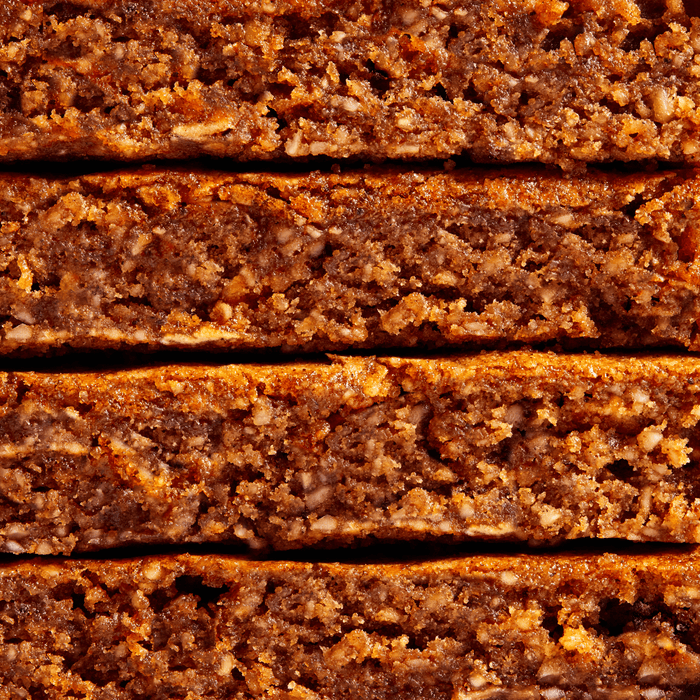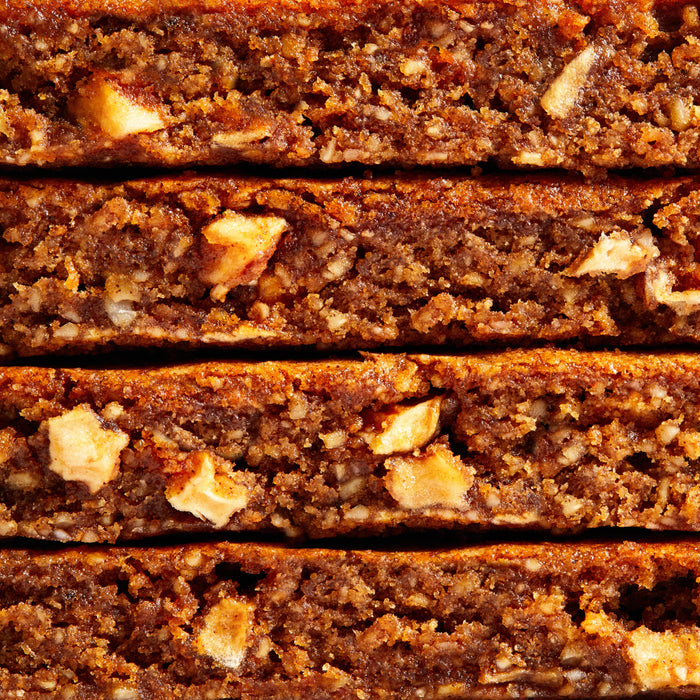

· By Najwa Khan
What is Cinnamon Good For? 6 Powerful Health Benefits
At Dalci we consider cinnamon – a traditional cooking spice with powerful healing properties, a pantry staple. You can find us dashing it into a warming bowl of morning oatmeal, sneaking it into a mid-day smoothie, or using it to elevate the flavors of a savory Moroccan tagine. We love this versatile and gut-friendly spice so much that we decided to bake it into our Apple Spice Blondie, and even pay tribute to it in our company name. Fun fact, Dalci is a play on the Hindi word for spice– Dalchini.
Cinnamon, down to its essential oils, is celebrated in the natural Indian medicine practice known as Ayurveda. Ayurvedic medicine is a centuries-old holistic approach towards health that promotes the use of natural therapies, such as yoga and diet for example, to heal an imbalanced body. Cinnamon has been used in this native practice of medicine to remedy both digestive and respiratory problems.
With its strong hold in traditional medicine, it’s no surprise then that cinnamon has piqued the interest of countless researchers who continue to observe the remedial properties of this medicinal plant. But, before we uncover the additional health benefits of this fragrant spice, let’s discuss its origin.
What is Cinnamon?
Your favorite spice is collected from the inner bark of evergreen trees originating from the genus Cinnamomum before it’s broken down into a fine dried powder or curled into sticks. While over 250 species of trees and shrubs belong to the genus Cinnamomum, the spice is mainly harvested from the Cinnamomum Zeylanicum and Cinnamon Cassia varieties. The latter variety is commonly known as Ceylon cinnamon or “true” cinnamon while the former is called Chinese cinnamon.
Although widely considered inferior to the Ceylon variety, you’re more likely to encounter Chinese cinnamon while scanning the aisle of your local supermarket or munching on store bought cinnamon rolls. A significant portion of cinnamon imported to North America from Indonesia – about 75%, is Chinese Cinnamon. In the USA, the sweet and spicy flavor of the Cassia variety is used to enhance classic all-American desserts like apple pie and coffee cake.
If you’re not dishing out extra dollars on Ceylon cinnamon, should you be concerned with consuming the much more readily available option? Unlike Ceylon – the pricier and milder tasting choice, Cassia contains higher levels of coumarin. Regular consumption of this plant compound over a long period of time may result in adverse health problems like liver damage. For reference, the European Food Safety Authority does not recommend exceeding your daily consumption of Chinese cinnamon to more than one teaspoon, with the spice containing between 5.18-12.1 mg of the harmful compound.
From a health perspective, “true” cinnamon might be the preferred option for spice lovers over the long-run due to its much lower levels of coumarin. With numerous studies supporting the impressive health benefits of Ceylon, it might be worth trekking down to your local health food grocer when your favorite recipe or daily breakfast calls for a pinch of cinnamon.
What is Cinnamon Good For?
- Defending the Body Against Disease Induced by Oxidative Stress
We all know the importance of consuming antioxidant rich foods– think berries, green tea, lemons and even dark chocolate (yum!), to fight against free radicals. Your cells are in for some serious harm if there are too many free radicals in your body and not enough antioxidants to combat against them. This imbalance in the body can result in oxidative stress– a major contributor to inflammation and disease. Lucky for you, cinnamon is jam-packed with antioxidants, with just one teaspoon of the good stuff containing just as much as a half cup of blueberries. In a comparative study, cinnamon was the clear winner when pitted against twenty-six other spices like clove and oregano, showing the highest antioxidant content.
- Protecting the Body Against Neurological Disorders
The onset of neurological disorders like Alzheimer’s or Parkinson’s disease can arise when oxidative stress occurs within the body. Through imaging tests, researches have linked abnormally shaped tau proteins, which are abundant within nerve cells, with the onset of memory loss and Alzheimer’s disease. A study published in the Journal of Alzheimer’s Disease found the extract derived from the inner bark of Ceylon cinnamon – Cinnamaldehyde, to be effective in preventing the formation of tau tangles in the brain.
- Lowering Blood Sugar & Fighting Against Type 2 Diabetes
For those looking to manage elevated blood sugar levels with a healthy and whole-foods diet, cinnamon could be the answer. With Type 2 diabetes the pancreas – an organ responsible for regulating blood sugar, fails to produce enough of the hormone insulin. A study inclusive of eighteen Type 2 diabetic patients found a greater decrease in blood sugar levels in the experimental group, providing the subjects with 1,000mg of cinnamon. Although both the experimental and control groups followed the same dietary guidelines, the results found the addition of the spice to be much more impactful than adhering to a strict diet alone.
- Supporting a Healthy Heart
Similar to inflammatory and neurological diseases like diabetes and Alzheimer’s, researchers have discovered oxidative stress in the body to be one of the root causes of cardiovascular disease, along with obesity. A USDA study involving twenty-two obese patients found cinnamon extract to be successful in protecting the body from oxidated damage. Although the recipients of the cinnamon extract followed their usual diet, they had a higher number of antioxidant variables measured in their blood samples than the subjects who received the placebo. An increase in dietary antioxidants like cinnamon in the body can prevent changes in proteins or DNA that may trigger the onset of heart disease.
- Managing Symptoms of PCOS
If you’ve heard the term insulin resistance floating around you might be curious to learn how it relates to polycystic ovary syndrome (PCOS). Although the symptoms for the condition among women can vary, one of the most common symptoms experienced by those diagnosed with PCOS is unexpected weight gain. Difficulty in maintaining a healthy weight through diet and exercise alone can be attributed to higher levels of insulin and lower blood sugar levels in the body which may trigger intense cravings for carbs and sweets. A recent study using mice found that the commonly used spice was successful in improving insulin sensitivity after measuring the blood glucose levels of the mice.
- Lowering Bad Cholesterol
Even if you don’t suffer from diabetes or a hormonal disorder like PCOS, you may want to include cinnamon into your daily diet to reap some of the benefits the spice has in treating high cholesterol. According to Mayo Clinic, the buildup of “bad” cholesterol or LDL in your body may lead to a heart attack or stroke if not managed properly by a healthy diet, reduced stress levels and daily exercise. In addition to lowering glucose levels, a recent study found the consumption of 500mg of cinnamon extract to be successful in decreasing LDL cholesterol.






